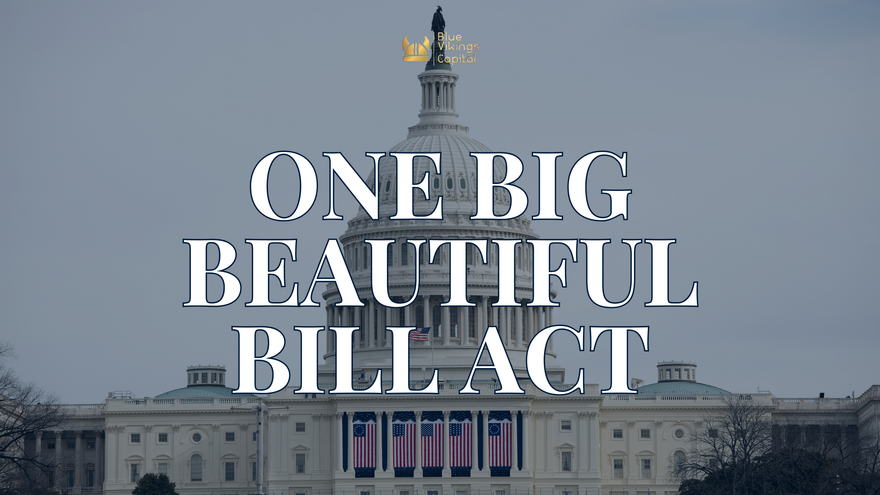What the One Big Beautiful Bill Act Means for Your Business and Investments — A Tax-Centric Breakdown

On July 4, 2025, the One Big Beautiful Bill Act was officially signed into law, ushering in a sweeping series of tax reforms aimed at stimulating business growth and long-term economic activity. While the legislation covers a broad array of policy areas, this article focuses exclusively on the tax provisions that most directly affect entrepreneurs, business owners, and real estate professionals.
For those who make decisions based on tax positioning, this bill delivers several meaningful updates. Here's what you need to know now that the law is in effect:
1. 100% Bonus Depreciation Made Permanent for Qualified Property
Section 70301 of the bill permanently establishes 100% bonus depreciation for qualified property placed in service after January 19, 2025. This includes machinery, equipment, and components of real estate with a recovery period of 20 years or less.
It does not apply to long-lived structural real estate, such as residential rental property with a 27.5-year recovery period. However, property identified through cost segregation studies—such as flooring, HVAC systems, appliances, and other short-life components—does qualify for immediate expensing.
Key takeaway: Investors and business owners can now fully expense qualifying assets in the year they’re placed in service, with no future phase-out. This is a powerful incentive to make capital improvements or acquisitions starting in 2025.
2. Permanent R&D Expensing
The law reverses the 2022 rule requiring research and development costs to be amortized over five years and instead allows immediate expensing of R&D activities. This change is also retroactive to tax years 2022, 2023, and 2024.
Key takeaway: Businesses investing in innovation—especially startups and tech firms—will benefit from front-loaded deductions and stronger cash flow.
3. SALT Deduction Cap Raised
The State and Local Tax (SALT) deduction cap is increased to:
- $40,000 for joint filers
- $20,000 for single filers
This new limit applies from tax year 2024 through 2029, with a phase-out for households earning between $500,000 and $600,000.
Key takeaway: Taxpayers in high-tax states like New York, California, and New Jersey will benefit significantly from this change, improving net returns for investors and business owners.
4. QBI Deduction Made Permanent
The 20% Qualified Business Income (QBI) deduction is now permanent for owners of pass-through entities such as LLCs, S-corporations, and partnerships. This removes uncertainty around the original 2026 expiration and adds predictability for long-term tax planning.
Key takeaway: Entrepreneurs and real estate investors using pass-through structures can confidently incorporate this deduction into their core tax strategy.
5. Estate Tax Exemption Increased to $15 Million
Starting in 2026, the lifetime estate and gift tax exemption will rise to $15 million per individual, indexed for inflation. This expanded threshold allows families to transfer more wealth tax-free and supports advanced planning strategies.
Key takeaway: High-net-worth individuals and real estate owners should review and update their estate plans to leverage the expanded exemption before future legislation potentially reduces it again.
6. Opportunity Zones Made Permanent
Section 70421 of the bill makes Opportunity Zones (OZs) a permanent part of the U.S. tax code and restores key incentives that had previously expired. These include:
- 10% step-up in basis after 5 years
- 15% step-up after 7 years
- 100% capital gains exclusion for investments held 10 years or more
The law also expands eligibility, requires stronger transparency and reporting, and allows investors to roll capital gains from one OZ investment to another without triggering taxes.
Key takeaway: With new permanence and enhanced benefits, Opportunity Zones offer compelling advantages for long-term real estate and business investments.
Why This Matters Now
Each of these changes is either already in effect or scheduled to take effect by the 2026 tax year. For real estate professionals, entrepreneurs, and small business owners, this presents a window of certainty and opportunity to optimize tax positioning.
This is the ideal time to meet with your CPA or tax strategist to:
- Accelerate capital purchases
- Revisit your business structure
- Align estate plans with the new exemption
- Explore Opportunity Zone investments
The One Big Beautiful Bill Act is now law. While broader political debates will continue, the tax provisions are clear, favorable, and ready for action.
Whether you're growing your business, expanding your real estate portfolio, or protecting generational wealth, this legislation offers significant advantages—and it’s worth taking the time to understand how to use them strategically.


0 comments
Leave a comment
Please log in or register to post a comment